Copying Beethoven英文读后感
《追风筝的人》英语读后感_《追风筝的人》英语读书笔记五篇
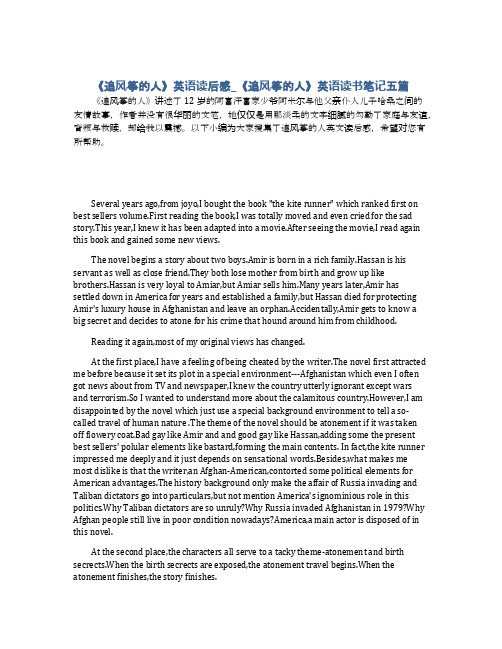
《追风筝的人》英语读后感_《追风筝的人》英语读书笔记五篇《追风筝的人》讲述了12岁的阿富汗富家少爷阿米尔与他父亲仆人儿子哈桑之间的友情故事,作者并没有很华丽的文笔,她仅仅是用那淡柔的文字细腻的勾勒了家庭与友谊,背叛与救赎,却给我以震撼。
以下小编为大家搜集了追风筝的人英文读后感,希望对您有所帮助。
Several years ago,from joyo,I bought the book "the kite runner" which ranked first on best sellers volume.First reading the book,I was totally moved and even cried for the sad story.This year,I knew it has been adapted into a movie.After seeing the movie,I read again this book and gained some new views.The novel begins a story about two boys.Amir is born in a rich family.Hassan is his servant as well as close friend.They both lose mother from birth and grow up like brothers.Hassan is very loyal to Amiar,but Amiar sells him.Many years later,Amir has settled down in America for years and established a family,but Hassan died for protecting Amir's luxury house in Afghanistan and leave an orphan.Accidentally,Amir gets to know abig secret and decides to atone for his crime that hound around him from childhood.Reading it again,most of my original views has changed.At the first place,I have a feeling of being cheated by the writer.The novel first attracted me before because it set its plot in a special environment---Afghanistan which even I often got news about from TV and newspaper,I knew the country utterly ignorant except warsand terrorism.So I wanted to understand more about the calamitous country.However,I am disappointed by the novel which just use a special background environment to tell a so-called travel of human nature .The theme of the novel should be atonement if it was takenoff flowery coat.Bad gay like Amir and and good gay like Hassan,adding some the present best sellers' polular elements like bastard,forming the main contents. In fact,the kite runner impressed me deeply and it just depends on sensational words.Besides,what makes memost dislike is that the writer,an Afghan-American,contorted some political elements for American advantages.The history background only make the affair of Russia invading and Taliban dictators go into particulars,but not mention America's ignominious role in this politics.Why Taliban dictators are so unruly?Why Russia invaded Afghanistan in 1979?Why Afghan people still live in poor condition nowadays?America,a main actor is disposed of in this novel.At the second place,the characters all serve to a tacky theme-atonement and birth secrects.When the birth secrects are exposed,the atonement travel begins.When the atonement finishes,the story finishes.I even feel I am wrapped around the American media's little finger.Many celebrities and book concerns writed good comments,which helped it ranke first on sales volume for several times and made readers think it must get widely praised and then bought it without doubt finally.Though I think the disadvantages are more than advatages,compared with the back atonement part,I like the front part that describes the pure friendship and innocent childhood between two boys.The description about the culture of kite in Afghanistan is excellent.As a first book of the writer,it is resonable that the novel has some deficiencies.I hope his next and next works can more and more perfect.I have seen the novel's name --the Kite Runner many times from the InterNet,when it comes to "the novels moved you most".With curiosity,I downloaded it.When reading the novel,from the beginning to the end,I felt a heavy stone of sorrow on my heart.It is a story about friendship,about fault and atonement,about the good and evil of human natual.The narrator of the story,Amir ,is born in a rich family.Hassan is his servant as well as close friend.They both lose mother from birth and grow up like brothers.From Hassan ,I see the most kind and beautiful soul.He never means to hurt anyone.he protects Amir bravely and has a broad mind to endure what Amir do to him.With the promise to run the kite,he hands the last cut kite to Amir though he has insulted by the bully,Assef. for lifetime,he cherishes the friendship,even he dies of protecting Amir's house."For you,a thousand times over"he does as he says…If Hassan can be described as an angel, then Amir is just a person.when he is a boy,he is badly want father's love and care.he will be jealous,he will fear and be cowardly.When he sees Hassan insulted by Assef,he is so scared that he only hides and watches.he sees what happened but keeps it as a secret.In order to escape the guilt,he makes another fault, making Hassan leave by framing Hassan .Years past, he is still haunted by betraying his childhood friend.I was shocked when the big secret reveals: Hassan is Amir's half brother,the son of his father and a sevant's wife! Amir's father lives a torturing life,he is torn into two parts.He can't give Hassan the love in the name of a father,which is unfair to Hassan.That explains why he seems care little about Amir …Knowing the truth,Amir has a painful struggle at the first,and finally chooses the right way,a way of atonement.He rescues Hassan's orphan ,Sorhab,from Assef's hand.At that time,he faces up to Assef's fists,being a man not cowardly.Having gone though a lot of difficulties,he finally brings Sorhab to American.But Sorhab is emotional damaged byadversity.Amir make efforts to revive the little heart.At the end of the story,Sorhab shows a lopside smile,which delights Amir much.Amir run kite for Hassan's son,and says what Hassan once said,"for you, a thousand times over".The snow will be melt,and the spring is coming…The ending is not clearly told,but full of hope.I like the author' written style.There's paragraghs of internal monologues,warm memorys , sad plots,horrible war scenes…the words,sentences always catch metightly,make me think,make me cry…Now if someone ask me what novels impres sed me most,The Kite Runner will be an answer.It is the first time I have seen a novel in English.It is hard for me to insist on reading as there are so many words I have to look up.But it really benefit me in some way.This is a wonderful, beautiful epic of a novel. Set in Afghanistan and the United States between the 1970s to the present day, it is a heartbreaking tale of a young boy, Amir, and his best friend who are torn apart. This is a classic word-of-mouth novel and is sure to become as universally loved as The God of Small Things and The Glass Palace.Twelve year old Amir is desperate to win the approval of his father Baba, one of the richest and most respected merchants in Kabul. He has failed to do so through academia or brawn, but the one area where they connect is the annual kite fighting tournament. Amir is determined not just to win the competition but to run the last kite and bring it home triumphantly, to prove to his father that he has the makings of a man. His loyal friend Hassan is the best kite runner that Amir has ever seen, and he promises to help him - for Hassan always helps Amir out of trouble. But Hassan is a Shi'a Muslim and this is 1970s Afghanistan. Hassan is taunted and jeered at by Amir's school friends; he is merely a servant living in a shack at the back of Amir's house. So why does Amir feel such envy towards his friend? Then, what happens to Hassan on the afternoon of the tournament is to shatter all their lives, and define their futures.The Kite Runner of Khaled Hosseini's deeply moving fiction debut is an illiterate Afghan boy with an uncanny instinct for predicting exactly where a downed kite will land. Growing up in the city of Kabul in the early 1970s, Hassan was narrator Amir's closest friend even though the loyal 11-year-old with "a face like a Chinese doll" was the son of Amir's father's servant and a member of Afghanistan's despised Hazara minority. But in 1975, on the day of Kabul's annual kite-fighting tournament, something unspeakable happened between the two boys.Narrated by Amir, a 40-year-old novelist living in California, The Kite Runner tells the gripping story of a boyhood friendship destroyed by jealousy, fear, and the kind of ruthless evil that transcends mere politics. Running parallel to this personal narrative of loss and redemption is the story of modern Afghanistan and of Amir's equally guilt-ridden relationship with the war-torn city of his birth. The first Afghan novel to be written in English, The Kite Runner begins in the final days of King Zahir Shah's 40-year reign andtraces the country's fall from a secluded oasis to a tank-strewn battlefield controlled by the Russians and then the trigger-happy Taliban. When Amir returns to Kabul to rescue Hassan's orphaned child, the personal and the political get tangled together in a plot that is as suspenseful as it is taut with feeling.The son of an Afghan diplomat whose family received political asylum in the United States in 1980, Hosseini combines the unflinching realism of a war correspondent with the satisfying emotional pull of master storytellers such as Rohinton Mistry. Like the kite that is its central image, the story line of this mesmerizing first novel occasionally dips and seems almost to dive to the ground. But Hosseini ultimately keeps everything airborne until his heartrending conclusion in an American piCnic park.It's a moving story and a mixture of love,fear,guilty,atonement and so on.For a lont time,it makes the books we read lost their color.The first time I read a book written by an Afghan atuhor named Khaled Hosseini ,it told a story between two boys.A rich boy Amir at the age of 12 and his servant Hasan were brotherly loved.Nevertheless,afer a kite game,something miserable happened.Amir feel grievous and guilty for his cowardice and he cannot confront Hansan,using something contempitable to let Hansan and his father leave his home.Not long,Afghanistan broke ou a war,Amir and his father had to fled to America.After his grown- up,he cannot forgave what he had done to Hansan before.And to atone for himself,he returned his hometown,which was destoryed badly by the war……Maybe all of us more or less had done something as Amir did before,we are too young to understand others feelings when we broke their heart into pieces.We may feel guilty and miserable for waht we have done.But there is no use to cry over spilt milk.What we really should do is to face the reality and like Amir,to atone for ourselves.I hate wars which make the world bloody ,cold and cruel, so I do not want to talk about the war. But it is miraculous to see a kite is cut off by another one. And the kite which is cut off flies away like a free bird. Hassan said to Amir that for you, one thousand times over. At first, I tought the friendship between Hassan and Amir was so deep. But then I found that Hassan was a servant in Amir’s home and began to realize it is some kind of loyalty.Though Hassan always said that Amir treated him as a friend, deep in his mind, he did not put them on the same line. In his eyes, Amir is the person he should look up to and protect, even do whatever he can do to help. Amir was affluence in material, but he did not have friends because of his race. I dislike him because he always ran away when Hassan was hurted by the others in order to protect him. In my opinion, if he stand up fo Hassan, things would have been different. I could not understand why Amir cheated to make Hassan leave at first, though their “friendship” is complicated. Now I come to kno w that Amir may try topush Hassan out of the position as a servant. And he wished that they stand in the same line and Hassan can chase for the things wanted by himself. Though Amir’s father said that a boy who won’t stand up for himself, becomes a man who won’t stand for anything, Amir finally turned into a brave man who standed up for Sohrab, the son of Hassan.The kite tied Hassan and Amir tighter tighly. When I saw Hassan running after the kite, I realized that he was chasing for freedom as well. However when I saw Hassan running after the kite, I thought he was learning to protect things he cherished. There are many kites we are willing to have, but do you have the courage to chase for them?《追风筝的人》相关文章:。
谁动了我的奶酪读后感英文版

谁动了我的奶酪读后感英文版谁动了我的奶酪读后感英文版读完一本名著以后,相信你会有不少感想吧,是时候静下心来好好写写读后感了。
可能你现在毫无头绪吧,下面是小编精心整理的谁动了我的'奶酪读后感英文版,欢迎阅读,希望大家能够喜欢。
With a happy but complex feeling, I closed the book and drowned myself into deep thought. I have to recognize that it’s lucky for me to read this book, which is just like a mirror of our daily life.Two lovely mice Sniff, Scurry together with two little people Hem and Haw live in a big maze. They have to find cheese to feed themselves. Just as their names show, Sniff has a great sense of sniff and Scurry is able to run very fast. However, they are mice with simple thoughts. There’s no doubt that two little people are much cleverer than these mice, which are regarded as low-level creature by people. But the ending is surprising enough: the mice become the lucky dog and firstly adapt the changing situation. While the mice have already found new cheese and tasted the happiness of adventure, our two little people are still discussing the reasons and anglicizing their situation. They are afraid of changing and losing, because their wisdom tells them changing is a dangerous thing. This time, wisdom is no longer an advantage for them. Apparently, humans’ overly complicated and emotional intelligence sometimes do not advance way. The poorest character is Hem, no one knows his fate in the future, but we can imagine how hard it will be. Refusing changes bring him nothing but sadness. Haw is much luckier, though his action is not as quick as two mice, he take changes the moment he awake to his fault and learn a lot from the process. There’s no doubtthat Haw’s handwriting on the wall is the brightest point in the whole story. These truths encourage us to go out of the dilemma and adjust ourselves to the changing circumstances and enjoy the changesObviously, the maze represents our whole life and cheese represent the valuable things that we pursuit. We ourselves are playing the role of mice or little people in our realistic life. May be you’re mice who can take quick actions to change, then congratulations! But what if you are Hem? I believe no one of us want to be a second Hem without any cheese. So, just try to become Haw, simplify the problems and try new things without worrying. Surprise is ahead of you, success is just there, waiting for you.In my opinion, this story is a kind of scathing satire on people who don’t have an ability to adapt new surroundings quickly. In the future, change is the only constant. If you don’t want to be eliminated by the changing time, if you want to keep pace with the changing tide, please keep the alertness and give up conservative ideas. The future is full of changes, since you are already in the maze, how to find your" cheese" is the problem you have to de al with. There’s an old saying in China called security is the biggest enemy. No one can deny that a constant job or something will kill people’s passion. But it will lead only two kinds of consequences: you make no progress or your condition becomes much worse. Someone refuse to change because of the fear from the bottom of their heart. If you can’t overcome this psychology barrier, you can’t knock open the door of success. All depends on you, choose to change and have a better life or to be stubborn and lose all the old cheese.Life is changing. Change is the only constant in the future. Allyou can do is to try your best to adapt the changing world bravely. God help those who help and change themselves!。
哈克贝利费恩历险记英文读后感
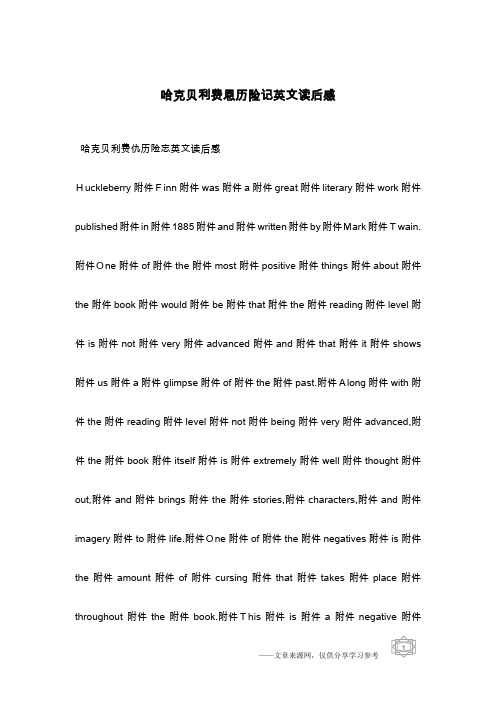
哈克贝利费恩历险记英文读后感哈克贝利费仇历险忘英文读后感Huckleberry附件Finn附件was附件a附件great附件literary附件work附件published附件in附件1885附件and附件written附件by附件Mark附件Twain.附件One附件of附件the附件most附件positive附件things附件about附件the附件book附件would附件be附件that附件the附件reading附件level附件is附件not附件very附件advanced附件and附件that附件it附件shows 附件us附件a附件glimpse附件of附件the附件past.附件Along附件with附件the附件reading附件level附件not附件being附件very附件advanced,附件the附件book附件itself附件is附件extremely附件well附件thought附件out,附件and附件brings附件the附件stories,附件characters,附件and附件imagery附件to附件life.附件One附件of附件the附件negatives附件is附件the附件amount附件of附件cursing附件that附件takes附件place附件throughout附件the附件book.附件This附件is附件a附件negative附件because附件it附件is附件at附件a附件children's附件reading附件level附件and附件it附件does附件not附件add附件any附件literary附件value附件to附件the附件book附件as附件a附件piece附件of附件history.附件The附件ugly附件but附件I附件believe附件necessary附件part附件of附件the附件book附件is附件the附件use附件of附件the附件n-word.附件This 附件is附件a附件necessary附件part附件of附件the附件book附件because 附件it附件shows附件to附件our附件children附件and附件everyone附件the附件meaning附件behind附件the附件word.附件If附件anything附件it 附件makes附件the附件reader附件more附件understanding附件of附件the 附件troubles附件that附件the附件slaves附件when附件though附件and 附件understand附件the附件meaning附件of附件the附件word附件a附件little附件more附件deeply.This附件book附件was附件great,附件a附件masterpiece附件for附件the 附件lack附件of附件words附件to附件describe附件how附件entirely附件wonderful附件it附件is.附件The附件book附件was附件a附件great附件classic,附件the附件only附件reason附件that附件I附件did附件read附件it附件is附件because附件we附件have附件to附件read附件a附件classic 附件for附件school,附件however,附件now附件that附件I附件have附件read 附件it附件I附件realize附件that附件it附件was附件a附件great附件book.附件I附件would附件read附件this附件book附件two附件or附件three附件times,附件and附件I附件do附件not附件like附件reading附件books附件again.附件The附件book附件was附件really附件able附件to附件portray 附件the附件idea附件of附件childhood附件innocence附件and附件foolishness附件in附件the附件book,附件especially附件the附件end.附件I附件thought附件that附件this附件book附件was附件really附件an附件eye 附件opener附件for附件people附件who附件may附件think附件that附件life附件is附件not附件worth附件living附件or附件maybe附件derpessed.附件Because,附件as附件you附件can附件see,附件Huck附件was附件a 附件young附件boy附件who附件had附件an附件alcoholic附件father附件who附件beat附件him附件all附件the附件time,附件even附件kidnapped附件him附件after附件he附件was附件adopted附件by附件other附件people.附件Huck附件even附件decided附件to附件run附件away附件from附件his附件father,附件yet附件he附件is附件still附件a附件young,附件fun附件loving附件kid附件in附件the附件end,附件especially附件when附件Tom 附件reveals附件to附件him附件how附件the附件whole附件trip附件was 附件just附件a附件game.附件The附件only附件thing附件I附件have附件to附件say附件against附件the附件book附件is附件that附件it附件did 附件seem附件a附件little附件racist附件with附件its附件words,附件however 附件maybe附件this附件is附件just附件how附件they附件talked附件in附件that附件time附件period必修附件Overall附件a附件great附件read附件that附件I附件highly附件reccomend.附件附件附件。
追风筝的人英文读后感
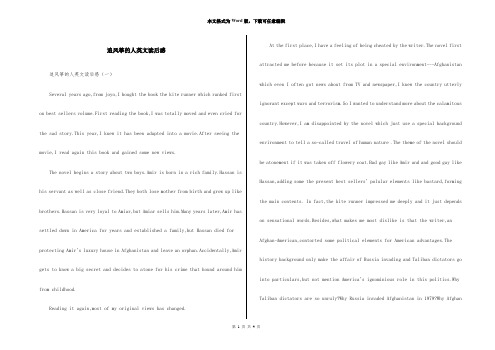
追风筝的人英文读后感追风筝的人英文读后感(一)Several years ago,from joyo,I bought the book the kite runner which ranked first on best sellers volume.First reading the book,I was totally moved and even cried for the sad story.This year,I knew it has been adapted into a movie.After seeing the movie,I read again this book and gained some new views.The novel begins a story about two boys.Amir is born in a rich family.Hassan is his servant as well as close friend.They both lose mother from birth and grow up like brothers.Hassan is very loyal to Amiar,but Amiar sells him.Many years later,Amir has settled down in America for years and established a family,but Hassan died for protecting Amir's luxury house in Afghanistan and leave an orphan.Accidentally,Amir gets to know a big secret and decides to atone for his crime that hound around him from childhood.Reading it again,most of my original views has changed. At the first place,I have a feeling of being cheated by the writer.The novel first attracted me before because it set its plot in a special environment---Afghanistan which even I often got news about from TV and newspaper,I knew the country utterly ignorant except wars and terrorism.So I wanted to understand more about the calamitous country.However,I am disappointed by the novel which just use a special background environment to tell a so-called travel of human nature .The theme of the novel should be atonement if it was taken off flowery coat.Bad gay like Amir and and good gay like Hassan,adding some the present best sellers' polular elements like bastard,forming the main contents. In fact,the kite runner impressed me deeply and it just depends on sensational words.Besides,what makes me most dislike is that the writer,an Afghan-American,contorted some political elements for American advantages.The history background only make the affair of Russia invading and Taliban dictators go into particulars,but not mention America's ignominious role in this politics.Why Taliban dictators are so unruly?Why Russia invaded Afghanistan in 1979?Why Afghanpeople still live in poor condition nowadays?America,a main actor is disposed of in this novel.At the second place,the characters all serve to a tacky theme-atonement and birth secrects.When the birth secrects are exposed,the atonement travel begins.When the atonement finishes,the story finishes.I even feel I am wrapped around the American media's little finger.Many celebrities and book concerns writed good comments,which helped it ranke first on sales volume for several times and made readers think it must get widely praised and then bought it without doubt finally.Though I think the disadvantages are more than advatages,compared with the back atonement part,I like the front part that describes the pure friendship and innocent childhood between two boys.The description about the culture of kite in Afghanistan is excellent.As a first book of the writer,it is resonable that the novel has some deficiencies.I hope his next and next works can more and more perfect.追风筝的人英文读后感(二)I have seen the novel's name --the Kite Runner many times from the Internet,when it comes to the novels moved you most.With curiosity,I downloaded it.When reading the novel,from the beginning to the end,I felt a heavy stone of sorrow on my heart. It is a story about friendship,about fault and atonement,about the good and evil of human natual.The narrator of the story,Amir ,is born in a rich family.Hassan is his servant as well as close friend.They both lose mother from birth and grow up like brothers. From Hassan ,I see the most kind and beautiful soul.He never means to hurt anyone.he protects Amir bravely and has a broad mind to endure what Amir do to him.With the promise to run the kite,he hands the last cut kite to Amir though he has insulted by the bully,Assef. for lifetime,he cherishes the friendship,even he dies ofprotecting Amir's house.For you,a thousand times overhe does as he saysIf Hassan can be described as an angel, then Amir is just a person.when he is a boy,he is badly want father's love and care.he will be jealous,he will fear and be cowardly.When he sees Hassan insulted by Assef,he is so scared that he only hides and watches.he sees what happened but keeps it as a secret.In order to escape the guilt,he makes another fault, making Hassan leave by framing Hassan .Years past, he is still haunted by betraying his childhood friend.I was shocked when the big secret reveals: Hassan is Amir's half brother,the son of his father and a sevant's wife! Amir's father lives a torturing life,he is torn into two parts.He can't give Hassan the love in the name of a father,which is unfair to Hassan.That explains why he seems care little about AmirKnowing the truth,Amir has a painful struggle at the first,and finally chooses the right way,a way of atonement.He rescues Hassan's orphan ,Sorhab,from Assef's hand.At that time,he faces up to Assef's fists,being a man not cowardly.Having gone though a lot of difficulties,he finally brings Sorhab to American.But Sorhab is emotional damaged by adversity.Amir make efforts to revive the little heart.At the end of the story,Sorhab shows a lopside smile,which delights Amir much.Amir run kite for Hassan's son,and says what Hassan once said,for you, a thousand times over.The snow will be melt,and the spring is comingThe ending is not clearly told,but full of hope.I like the author' written style.There's paragraghs of internal monologues,warm memorys , sad plots,horrible war scenesthe words,sentences always catch me tightly,make me think,make me cryNow if someone ask me what novels impressed me most,The Kite Runner will be an answer.It is the first time I have seen a novel in English.It is hard for me to insist on reading as there are so many words I have to look up.But it really benefit me in some way.追风筝的人英文读后感(三)It's a moving story and a mixture of love,fear,guilty,atonement and so on.For a lont time,it makes the books we read lost their color.The first time I read a book written by an Afghan atuhor named Khaled Hosseini ,it told a story between two boys.A rich boy Amir at the age of 12 and his servant Hasan were brotherly loved.Nevertheless,afer a kite game,something miserable happened.Amir feel grievous and guilty for his cowardice and he cannot confront Hansan,using something contempitable to let Hansan and his father leave his home.Notlong,Afghanistan broke ou a war,Amir and his father had to fled to America.After his grown- up,he cannot forgave what he had done to Hansan before.And to atone for himself,he returned his hometown,which was destoryed badly by the warMaybe all of us more or less had done something as Amir did before,we are too young to understand others feelings when we broke their heart into pieces.We may feel guilty and miserable for waht we have done.But there is no use to cry over spilt milk.What we really should do is to face the reality and like Amir,to atone for ourselves.。
《追风筝的人》英文读后感500词
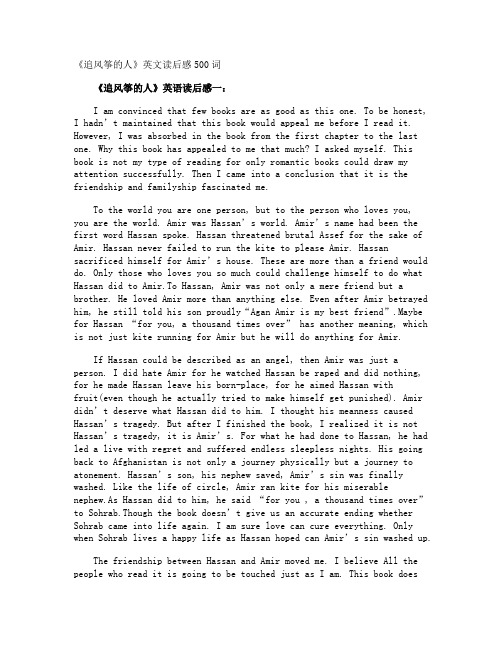
《追风筝的人》英文读后感500词《追风筝的人》英语读后感一:I am convinced that few books are as good as this one. To be honest, I hadn’t maintained that this book would appeal me before I read it. However, I was absorbed in the book from the first chapter to the last one. Why this book has appealed to me that much? I asked myself. This book is not my type of reading for only romantic books could draw my attention successfully. Then I came into a conclusion that it is the friendship and familyship fascinated me.To the world you are one person, but to the person who loves you, you are the world. Amir was Hassan’s world. Amir’s name had been the first word Hassan spoke. Hassan threatened brutal Assef for the sake of Amir. Hassan never failed to run the kite to please Amir. Hassan sacrificed himself for Amir’s house. These are more than a friend would do. Only those who loves you so much could challenge himself to do what Hassan did to Amir.To Hassan, Amir was not only a mere friend but a brother. He loved Amir more than anything else. Even after Amir betrayed him, he still told his son proudly“Agan Amir is my best friend”.Maybe for Hassan “for you, a thousand times over” has another meaning, which is not just kite running for Amir but he will do anything for Amir.If Hassan could be described as an angel, then Amir was just a person. I did hate Amir for he watched Hassan be raped and did nothing, for he made Hassan leave his born-place, for he aimed Hassan withfruit(even though he actually tried to make himself get punished). Amir didn’t deserve what Hassan did to him. I thought his meanness caused Hassan’s tragedy. But after I finished the book, I realized it is not Hassan’s tragedy, it is Amir’s. For what he had done to Hassan, he had led a live with regret and suffered endless sleepless nights. His going back to Afghanistan is not only a journey physically but a journey to atonement. Hassan’s son, his nephew saved, Amir’s sin was finally washed. Like the life of circle, Amir ran kite for his miserable nephew.As Hassan did to him, he said “for you , a thousand times over” to Sohrab.Though the book doesn’t give us an accurate ending whether Sohrab came into life again. I am sure love can cure everything. Only when Sohrab lives a happy life as Hassan hoped can Amir’s sin washed up.The friendship between Hassan and Amir moved me. I believe All the people who read it is going to be touched just as I am. This book doesmake me think the good and the bad ,what’s wrong and what’s right, the cruelty of war . Few books can exert an influence on people nowadays, this book sure does.《追风筝的人》英语读后感二:Several years ago,from joyo,I bought the book "the kite runner" which ranked first on best sellers volume.First reading the book,I was totally moved and even cried for the sad story.This year,I knew it has been adapted into a movie.After seeing the movie,I read again this book and gained some new views.The novel begins a story about two boys.Amir is born in a rich family.Hassan is his servant as well as close friend.They both lose mother from birth and grow up like brothers.Hassan is very loyal to Amiar,but Amiar sells him.Many years later,Amir has settled down in America for years and established a family,but Hassan died forprotecting Amir's luxury house in Afghanistan and leave anorphan.Accidentally,Amir gets to know a big secret and decides to atone for his crime that hound around him from childhood.Reading it again,most of my original views has changed.At the first place,I have a feeling of being cheated by thewriter.The novel first attracted me before because it set its plot in a special environment---Afghanistan which even I often got news about from TV and newspaper,I knew the country utterly ignorant except wars and terrorism.So I wanted to understand more about the calamitouscountry.However,I am disappointed by the novel which just use a special background environment to tell a so-called travel of human nature .The theme of the novel should be atonement if it was taken off flowery coat.Bad gay like Amir and and good gay like Hassan,adding some the present best sellers' polular elements like bastard,forming the main contents. In fact,the kite runner impressed me deeply and it just depends on sensational words.Besides,what makes me most dislike is that the writer,an Afghan-American,contorted some political elements for American advantages.The history background only make the affair of Russia invading and Taliban dictators go into particulars,but not mention America's ignominious role in this politics.Why Talibandictators are so unruly?Why Russia invaded Afghanistan in 1979?Why Afghan people still live in poor condition nowadays?America,a main actor is disposed of in this novel.At the second place,the characters all serve to a tacky theme-atonement and birth secrects.When the birth secrects are exposed,the atonement travel begins.When the atonement finishes,the story finishes.I even feel I am wrapped around the American media's littlefinger.Many celebrities and book concerns writed good comments,which helped it ranke first on sales volume for several times and made readers think it must get widely praised and then bought it without doubt finally.Though I think the disadvantages are more than advatages,compared with the back atonement part,I like the front part that describes the pure friendship and innocent childhood between two boys.The description about the culture of kite in Afghanistan is excellent.As a first book of the writer,it is resonable that the novel has some deficiencies.I hope his next and next works can more and more perfect.。
《追风筝的人》英文读后感
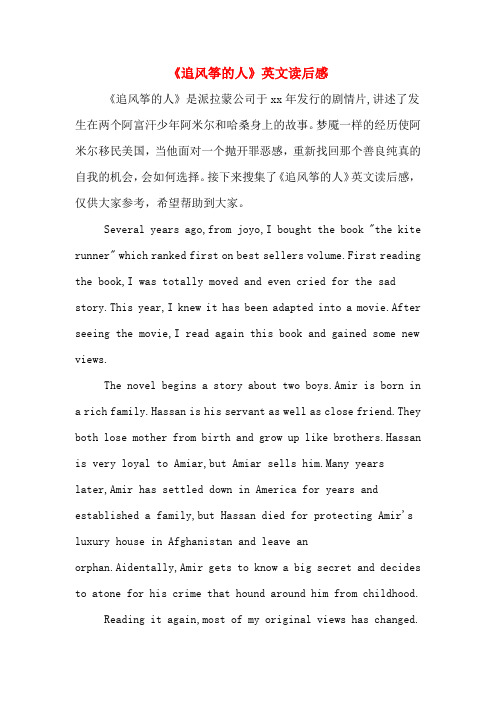
《追风筝的人》英文读后感《追风筝的人》是派拉蒙公司于xx年发行的剧情片,讲述了发生在两个阿富汗少年阿米尔和哈桑身上的故事。
梦魇一样的经历使阿米尔移民美国,当他面对一个抛开罪恶感,重新找回那个善良纯真的自我的机会,会如何选择。
接下来搜集了《追风筝的人》英文读后感,仅供大家参考,希望帮助到大家。
Several years ago,from joyo,I bought the book "the kite runner" which ranked first on best sellers volume.First reading the book,I was totally moved and even cried for the sad story.This year,I knew it has been adapted into a movie.After seeing the movie,I read again this book and gained some new views.The novel begins a story about two boys.Amir is born in a rich family.Hassan is his servant as well as close friend.They both lose mother from birth and grow up like brothers.Hassan is very loyal to Amiar,but Amiar sells him.Many yearslater,Amir has settled down in America for years and established a family,but Hassan died for protecting Amir's luxury house in Afghanistan and leave anorphan.Aidentally,Amir gets to know a big secret and decides to atone for his crime that hound around him from childhood. Reading it again,most of my original views has changed.At the first place,I have a feeling of being cheated by the writer.The novel first attracted me before because it set its plot in a special environment---Afghanistan which even I often got news about from TV and newspaper,I knew the country utterly ignorant except wars and terrorism.So I wanted to understand more about the calamitous country.However,I am disappointed by the novel which just use a special background environment to tell a so-called travel of human nature .The theme of the novel should be atonement if it was taken off flowery coat.Bad gay like Amir and and good gay like Hassan,adding some the present best sellers' polular elements like bastard,forming the main contents. In fact,the kite runner impressed me deeply and it just depends on sensational words.Besides,what makes me most dislike is that the writer,an Afghan-American,contorted some political elements for American advantages.The history background only make the affair of Russia invading and Taliban dictators go into particulars,but not mention America's ignominious role in this politics.Why Taliban dictators are so unruly?Why Russia invaded Afghanistan in 1979?Why Afghan people still live in poor condition nowadays?America,a main actor is disposed of in this novel.At the second place,the characters all serve to a tacky theme-atonement and birth secrects.When the birth secrects are exposed,the atonement travel begins.When the atonement finishes,the story finishes.I even feel I am wrapped around the American media's little finger.Many celebrities and book concerns writed good ments,which helped it ranke first on sales volume for several times and made readers think it must get widely praised and then bought it without doubt finally.Though I think the disadvantages are more than advatages,pared with the back atonement part,I like the front part that describes the pure friendship and innocent childhood between two boys.The description about the culture of kite in Afghanistan is excellent.As a first book of the writer,it is resonable that the novel has some deficiencies.I hope his next and next works can more and more perfect.I have seen the novel's name --the Kite Runner many times from the Inter,when it es to "the novels moved you most".With curiosity,I downloaded it.When reading the novel,from the beginning to the end,I felt a heavy stone of sorrow on my heart.It is a story about friendship,about fault and atonement,about the good and evil of human natual.The narrator of the story,Amir ,is born in a rich family.Hassan is his servant as well as close friend.They both lose mother from birth and grow up like brothers.From Hassan ,I see the most kind and beautiful soul.He never means to hurt anyone.he protects Amir bravely and has a broad mind to endure what Amir do to him.With the promise to run the kite,he hands the last cut kite to Amir though he has insulted by the bully,Assef. for lifetime,he cherishes the friendship,even he dies of protecting Amir's house."For you,a thousand times over"he does as he says…If Hassan can be described as an angel, then Amir is just a person.when he is a boy,he is badly want father's love and care.he will be jealous,he will fear and be cowardly.When he sees Hassan insulted by Assef,he is so scared that he only hides and watches.he sees what happened but keeps it as a secret.In order to escape the guilt,he makes another fault, making Hassan leave by framing Hassan .Years past, he is still haunted by betraying his childhood friend.I was shocked when the big secret reveals: Hassan is Amir's half brother,the son of his father and a sevant's wife! Amir'sfather lives a torturing life,he is torn into two parts.He can't give Hassan the love in the name of a father,which is unfair to Hassan.That explains why he seems care little about Amir … Knowing the truth,Amir has a painful struggle at the first,and finally chooses the right way,a way of atonement.He rescues Hassan's orphan ,Sorhab,from Assef's hand.At that time,he faces up to Assef's fists,being a man not cowardly.Having gone though a lot of difficulties,he finally brings Sorhab to American.But Sorhab is emotional damaged by adversity.Amir make efforts to revive the little heart.At the end of the story,Sorhab shows a lopside smile,which delights Amir much.Amir run kite for Hassan's son,and says what Hassan once said,"for you, a thousand times over".The snow will be melt,and the spring is ing…The ending is not clearly told,but full of hope.I like the author' written style.There's paragraghs of internal monologues,warm memorys , sad plots,horrible war scenes…the words,sentences always catch me tightly,make me think,make me cry…Now if someone ask me what novels impressed me most,The Kite Runner will be an answer.It is the first time I have seen a novel in English.It is hard for me to insist on reading as there are so many words I have to look up.But it really benefit me in some way.This is a wonderful, beautiful epic of a novel. Set in Afghanistan and the United States between the 1970s to the present day, it is a heartbreaking tale of a young boy, Amir, and his best friend who are torn apart. This is a classic word-of-mouth novel and is sure to bee as universally loved as The God of Small Things and The Glass Palace.Twelve year old Amir is desperate to win the approval of his father Baba, one of the richest and most respected merchants in Kabul. He has failed to do so through academia or brawn, but the one area where they connect is the annual kite fighting tournament. Amir is determined not just to win the petition but to run the last kite and bring it home triumphantly, to prove to his father that he has the makings of a man. His loyal friend Hassan is the best kite runner that Amir has ever seen, and he promises to help him - for Hassan always helps Amir out of trouble. But Hassan is a Shi'a Muslim and this is 1970s Afghanistan. Hassan is taunted and jeered at by Amir's school friends; he is merely a servant living in a shack at the back of Amir's house. So why does Amir feel such envy towards hisfriend? Then, what happens to Hassan on the afternoon of the tournament is to shatter all their lives, and define their futures.The Kite Runner of Khaled Hosseini's deeply moving fiction debut is an illiterate Afghan boy with an uncanny instinct for predicting exactly where a downed kite will land. Growing up in the city of Kabul in the early 1970s, Hassan was narrator Amir's closest friend even though the loyal 11-year-old with "a face like a Chinese doll" was the son of Amir's father's servant and a member of Afghanistan's despised Hazara minority. But in 1975, on the day of Kabul's annual kite-fighting tournament, something unspeakable happened between the two boys.Narrated by Amir, a 40-year-old novelist living in California, The Kite Runner tells the gripping story of a boyhood friendship destroyed by jealousy, fear, and the kind of ruthless evil that transcends mere politics. Running parallel to this personal narrative of loss and redemption is the story of modern Afghanistan and of Amir's equallyguilt-ridden relationship with the war-torn city of his birth. The first Afghan novel to be written in English, The Kite Runner begins in the final days of King Zahir Shah's 40-year reign andtraces the country's fall from a secluded oasis to a tank-strewn battlefield controlled by the Russians and then thetrigger-happy Taliban. When Amir returns to Kabul to rescue Hassan's orphaned child, the personal and the political get tangled together in a plot that is as suspenseful as it is taut with feeling.The son of an Afghan diplomat whose family received political asylum in the United States in 1980, Hosseini bines the unflinching realism of a war correspondent with the satisfying emotional pull of master storytellers such as Rohinton Mistry. Like the kite that is its central image, the story line of this mesmerizing first novel oasionally dips and seems almost to dive to the ground. But Hosseini ultimately keeps everything airborne until his heartrending conclusion in an American piic park.。
哈克贝利费恩历险记读后感英文版
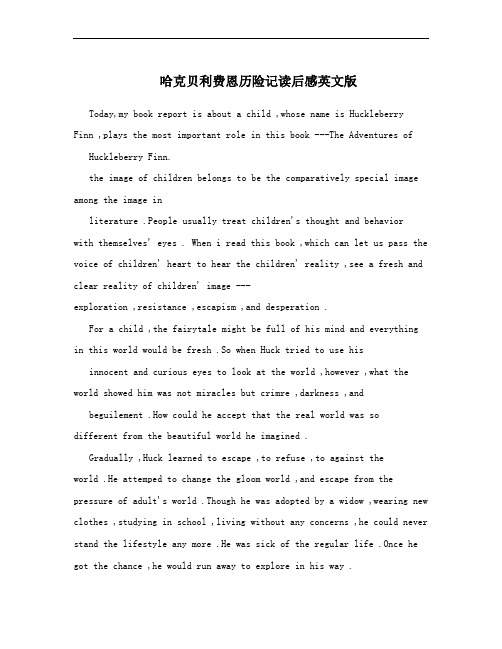
哈克贝利费恩历险记读后感英文版Today,my book report is about a child ,whose name is HuckleberryFinn ,plays the most important role in this book ---The Adventures of Huckleberry Finn.the image of children belongs to be the comparatively special image among the image inliterature .People usually treat children's thought and behaviorwith themselves' eyes . When i read this book ,which can let us pass the voice of children' heart to hear the children' reality ,see a fresh and clear reality of children' image ---exploration ,resistance ,escapism ,and desperation .For a child ,the fairytale might be full of his mind and everything in this world would be fresh .So when Huck tried to use his innocent and curious eyes to look at the world ,however ,what the world showed him was not miracles but crimre ,darkness ,and beguilement .How could he accept that the real world was sodifferent from the beautiful world he imagined .Gradually ,Huck learned to escape ,to refuse ,to against theworld .He attemped to change the gloom world ,and escape from the pressure of adult's world .Though he was adopted by a widow ,wearing new clothes ,studying in school ,living without any concerns ,he could never stand the lifestyle any more .He was sick of the regular life .Once he got the chance ,he would run away to explore in his way .During his exploration ,he met a slave ,Jim ,who was escapingfrom his hoster .Under the grimy world ,Huck was surprised to discover that Jim was so kind and nice that he decided to help Jim to avoided being slave again .Huck pursued the nature in his unconsciousness ,"I got into my old rags ,and my suger-hogsheadagain ,and was free andsatisfied ."This is the voice from the bottom of hisheart .Acturally ,helpig Jimescape ,running away from his family ,these were all his ways to show his resistance to the disgusted world ,and it was also an unconscious exploration of approaching the nature ,pursuing thefreedom ,and slipping the leash .A child could do nothing except escaping from hisunsatisfired situation .Huck tried to do something to change the world but nothing had changed .To Huck ,the end of his adventure was tragic .His resistance to the world only caused onething :desperaion .But for us ,he was a winner ,He let us know the great effort he made to change theworld ,as well as the children's world and children's reality .These are all my opinions about this book .Thanks for yourlistening .。
从林历险记英文读后感
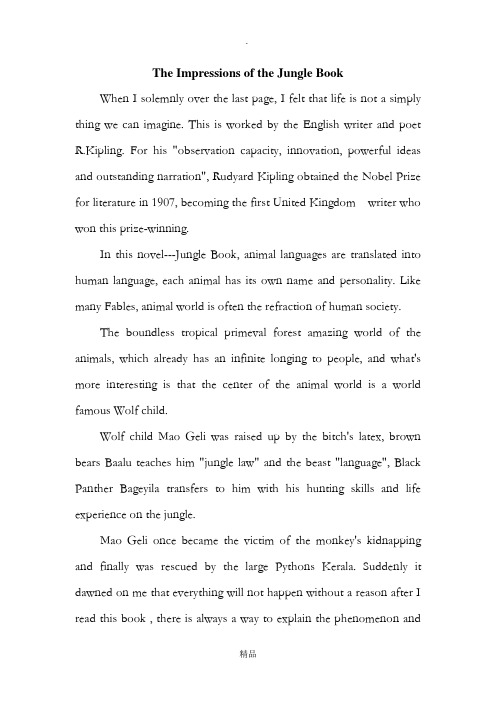
The Impressions of the Jungle BookWhen I solemnly over the last page, I felt that life is not a simply thing we can imagine. This is worked by the English writer and poet R.Kipling. For his "observation capacity, innovation, powerful ideas and outstanding narration", Rudyard Kipling obtained the Nobel Prize for literature in 1907, becoming the first United Kingdom writer who won this prize-winning.In this novel---Jungle Book, animal languages are translated into human language, each animal has its own name and personality. Like many Fables, animal world is often the refraction of human society.The boundless tropical primeval forest amazing world of the animals, which already has an infinite longing to people, and what's more interesting is that the center of the animal world is a world famous Wolf child.Wolf child Mao Geli was raised up by the bitch's latex, brown bears Baalu teaches him "jungle law" and the beast "language", Black Panther Bageyila transfers to him with his hunting skills and life experience on the jungle.Mao Geli once became the victim of the monkey's kidnapping and finally was rescued by the large Pythons Kerala. Suddenly it dawned on me that everything will not happen without a reason after I read this book , there is always a way to explain the phenomenon andthe answer or the solution is waiting for you if you are for it. Along with the Bushman, he has withstood the ordeal of the century of unprecedented drought, hear the "Genesis" of the animals' world and experienced the "jungle law" of power. And this teaches me now that you are in a special circumstance there is always a rule for you to obey to , otherwise, you will be kicked out by the ignorance of the rule. In the animal world, as in human world, all subject to the same regulations, where there is a true and false, good and evil, beauty and ugliness of the struggle. Particularly what worthes mentioning is that in this book greedy, cruel and absurd of human are exposed through the innocent eyes of Wolf child and a variety of animals.Kipling's jungle story's charm has been enduring. For today's readers, being in strict accordance with the "jungle law" inspires us to living peacefully with animals in the world. The current world, there are pollution, deforestation, endless of the social effects of pollution on the world. In this case, the Jungle Book by Rudyard Kipling is no doubt a great pair of medicine of the world."I understand Rudyard Kipling's book...For they will never become pale, they will stay with a rainbow of color; they are always fresh. ”Mark Twain once said to praise Kipling's work---Jungle Book 如有侵权请联系告知删除,感谢你们的配合!。
贝多芬传英语读后感
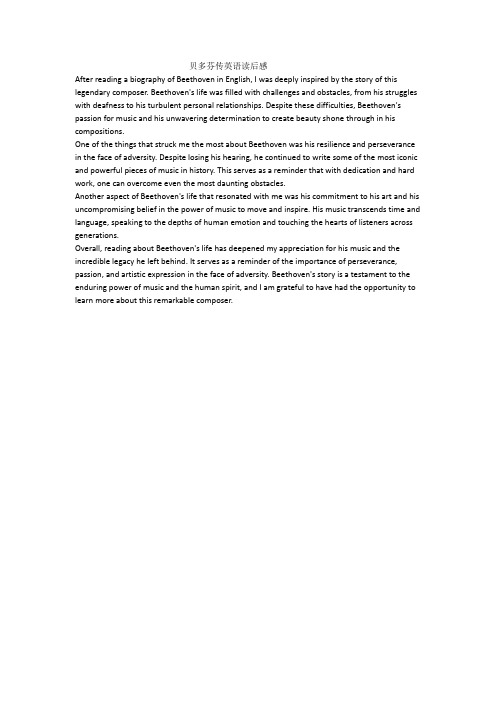
贝多芬传英语读后感After reading a biography of Beethoven in English, I was deeply inspired by the story of this legendary composer. Beethoven's life was filled with challenges and obstacles, from his struggles with deafness to his turbulent personal relationships. Despite these difficulties, Beethoven's passion for music and his unwavering determination to create beauty shone through in his compositions.One of the things that struck me the most about Beethoven was his resilience and perseverance in the face of adversity. Despite losing his hearing, he continued to write some of the most iconic and powerful pieces of music in history. This serves as a reminder that with dedication and hard work, one can overcome even the most daunting obstacles.Another aspect of Beethoven's life that resonated with me was his commitment to his art and his uncompromising belief in the power of music to move and inspire. His music transcends time and language, speaking to the depths of human emotion and touching the hearts of listeners across generations.Overall, reading about Beethoven's life has deepened my appreciation for his music and the incredible legacy he left behind. It serves as a reminder of the importance of perseverance, passion, and artistic expression in the face of adversity. Beethoven's story is a testament to the enduring power of music and the human spirit, and I am grateful to have had the opportunity to learn more about this remarkable composer.。
追风筝的人英语读后感200字左右
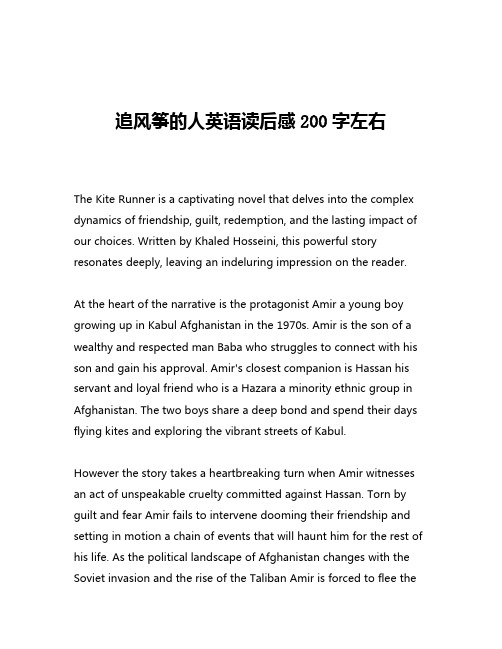
追风筝的人英语读后感200字左右The Kite Runner is a captivating novel that delves into the complex dynamics of friendship, guilt, redemption, and the lasting impact of our choices. Written by Khaled Hosseini, this powerful story resonates deeply, leaving an indeluring impression on the reader.At the heart of the narrative is the protagonist Amir a young boy growing up in Kabul Afghanistan in the 1970s. Amir is the son of a wealthy and respected man Baba who struggles to connect with his son and gain his approval. Amir's closest companion is Hassan his servant and loyal friend who is a Hazara a minority ethnic group in Afghanistan. The two boys share a deep bond and spend their days flying kites and exploring the vibrant streets of Kabul.However the story takes a heartbreaking turn when Amir witnesses an act of unspeakable cruelty committed against Hassan. Torn by guilt and fear Amir fails to intervene dooming their friendship and setting in motion a chain of events that will haunt him for the rest of his life. As the political landscape of Afghanistan changes with the Soviet invasion and the rise of the Taliban Amir is forced to flee thecountry and rebuild his life in America.Years later Amir is presented with an opportunity to return to Afghanistan and confront the ghosts of his past. This journey forces him to come to terms with the decisions he made as a child and the impact they had not only on his own life but on those of the people he cared about most. The Kite Runner is a poignant exploration of the power of redemption and the ability of the human spirit to heal even the deepest wounds.One of the most compelling aspects of the novel is the way Hosseini weaves the political and social turmoil of Afghanistan into the personal story of Amir and his family. The backdrop of war and oppression provides a powerful context for the characters struggles and underscores the universal themes of the story. The vivid descriptions of Kabul in its heyday and the gradual descent into chaos under Taliban rule offer a glimpse into a country and a culture that is often misunderstood in the West.Beyond the political dimension the novel is also a deeply personal exploration of the complex dynamics of father-son relationships. Amir's struggle to earn his father's love and approval is a universal struggle that resonates with readers from all walks of life. Baba's gruff exterior and high expectations create a rift between father and son that is both heartbreaking and relatable.The relationship between Amir and Hassan is equally compelling. Their childhood friendship is depicted with such warmth and authenticity that the reader cannot help but be invested in their story. The betrayal that tears them apart is devastating and the lingering guilt that Amir carries is palpable. The novel's exploration of loyalty friendship and the consequences of our actions is profoundly moving.One of the novel's greatest strengths is its ability to grapple with complex moral questions without providing easy answers. The characters are flawed and their actions are often morally ambiguous yet the reader is compelled to empathize with them and understand the motivations behind their choices. The novel challenges the reader to consider the nature of good and evil and the gray areas in between.Ultimately The Kite Runner is a testament to the resilience of the human spirit. Despite the tragedies and hardships that the characters endure the novel ultimately offers a message of hope and the possibility of redemption. Amir's journey to confront his past and make amends for his actions is a powerful reminder that it is never too late to seek forgiveness and find peace.In conclusion The Kite Runner is a masterful work of fiction thattranscends the boundaries of genre. It is a poignant exploration of the human condition that will linger in the reader's mind long after the last page has been turned. Hosseini's beautiful writing and his ability to craft complex multidimensional characters make this novel a true literary gem. It is a story that deserves to be read and re-read savored and discussed for generations to come.。
谁动了我的奶酪英文读后感150字
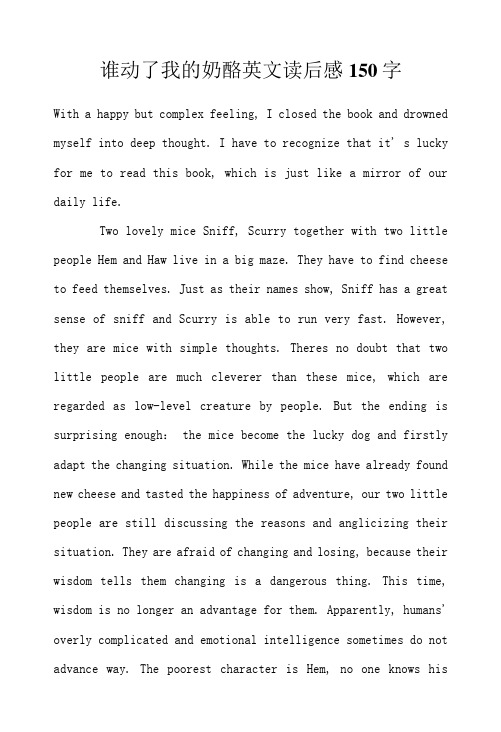
谁动了我的奶酪英文读后感150字With a happy but complex feeling, I closed the book and drowned myself into deep thought. I have to recognize that it' s lucky for me to read this book, which is just like a mirror of our daily life.Two lovely mice Sniff, Scurry together with two little people Hem and Haw live in a big maze. They have to find cheese to feed themselves. Just as their names show, Sniff has a great sense of sniff and Scurry is able to run very fast. However, they are mice with simple thoughts. Theres no doubt that two little people are much cleverer than these mice, which are regarded as low-level creature by people. But the ending is surprising enough: the mice become the lucky dog and firstly adapt the changing situation. While the mice have already found new cheese and tasted the happiness of adventure, our two little people are still discussing the reasons and anglicizing their situation. They are afraid of changing and losing, because their wisdom tells them changing is a dangerous thing. This time, wisdom is no longer an advantage for them. Apparently, humans' overly complicated and emotional intelligence sometimes do not advance way. The poorest character is Hem, no one knows hisfate in the future, but we can imagine how hard it will be. Refusing changes bring him nothing but sadness. Haw is much luckier, though his action is not as quick as two mice, he take changes the moment he awake to his fault and learn a lot from the process. There' s no doubt that Haw' s handwriting on the wall is the brightest point in the whole story. These truths encourage us to go out of the dilemma and adjust ourselves to the changing circumstances and enjoy the changesObviously, the maze represents our whole life and cheese represent the valuable things that we pursuit. We ourselves are playing the role of mice or little people in our realistic life. May be you' re mice who can take quick actions to change, then congratulations! But what if you are Hem? I believe no one of us want to be a second Hem without any cheese. So, just try to become Haw, simplify the problems and try new things without worrying. Surprise is ahead of you, success is just there, waiting for you.In my opinion, this story is a kind of scathing satire on people who don ' t have an ability to adapt new surroundings quickly. In the future, change is the only constant. If you don't want to be eliminated by the changing time, if you wantto keep pace with the changing tide, please keep the alertness and give up conservative ideas. The future is full of changes, since you are already in the maze, how to find your" cheese“ is the problem you have to deal with. Theres an old saying in China called security is the biggest enemy. No one can deny that a constant job or something will kill people' s passion. But it will lead only two kinds of consequences: you make no progress or your condition becomes much worse. Someone refuse to change because of the fear from the bottom of their heart. If you can' t overcome this psychology barrier, you can' t knock open the door of success. All depends on you, choose to change and have a better life or to be stubborn and lose all the old cheese.Life is changing. Change is the only constant in the future. All you can do is to try your best to adapt the changing world bravely. God help those who help and change themselves!。
比诺曹 读后感 英文
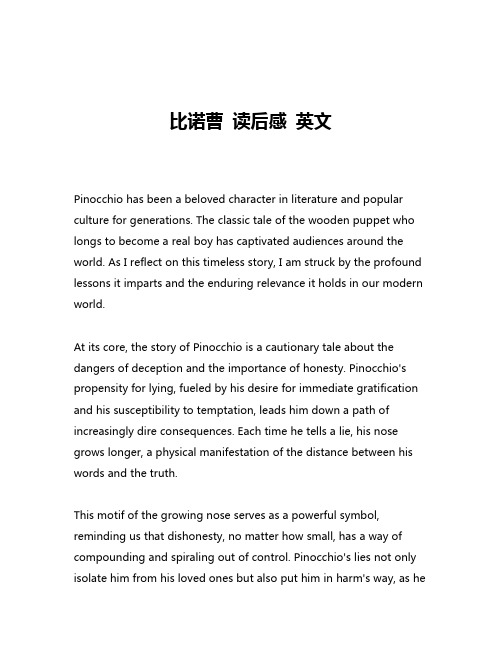
比诺曹读后感英文Pinocchio has been a beloved character in literature and popular culture for generations. The classic tale of the wooden puppet who longs to become a real boy has captivated audiences around the world. As I reflect on this timeless story, I am struck by the profound lessons it imparts and the enduring relevance it holds in our modern world.At its core, the story of Pinocchio is a cautionary tale about the dangers of deception and the importance of honesty. Pinocchio's propensity for lying, fueled by his desire for immediate gratification and his susceptibility to temptation, leads him down a path of increasingly dire consequences. Each time he tells a lie, his nose grows longer, a physical manifestation of the distance between his words and the truth.This motif of the growing nose serves as a powerful symbol, reminding us that dishonesty, no matter how small, has a way of compounding and spiraling out of control. Pinocchio's lies not only isolate him from his loved ones but also put him in harm's way, as hefalls victim to the schemes of cunning characters like the Fox and the Cat. The message is clear: honesty is the foundation upon which trust and genuine relationships are built.Yet, the story of Pinocchio is not merely a simplistic morality tale. It also explores the complex nature of transformation and the struggle to become one's true self. Pinocchio's ultimate goal is to break free from his wooden constraints and become a real boy, a transformation that represents the universal human desire for growth, self-actualization, and belonging.The journey Pinocchio undertakes is fraught with obstacles and temptations, as he is constantly pulled between his innate desire for freedom and the security of his familiar wooden form. The Blue Fairy, who serves as Pinocchio's guide and conscience, represents the guiding force that ultimately helps him navigate this treacherous path.Through his encounters with the Blue Fairy, Pinocchio learns that true transformation requires not only a change in outward appearance but also a transformation of the heart and mind. It is only when he takes responsibility for his actions, demonstrates genuine remorse, and commits himself to becoming a better version of himself that he is finally granted the opportunity to become a real boy.This emphasis on inner growth and moral development is a testament to the depth and complexity of the Pinocchio story. It reminds us that true transformation is not a simple or linear process, but rather a lifelong journey of self-discovery, introspection, and the cultivation of virtues like honesty, courage, and compassion.Furthermore, the story of Pinocchio resonates with us on a broader, societal level. The temptations and distractions that lure Pinocchio away from his path – such as the promise of easy wealth and the allure of hedonistic pleasures – are reflective of the many seductions that can lead us astray in our own lives.Just as Pinocchio is susceptible to the manipulations of the Fox and the Cat, we too can fall victim to the machinations of those who seek to exploit our weaknesses and capitalize on our desires for instant gratification. The story serves as a cautionary tale, urging us to be vigilant, to resist the siren call of easy solutions, and to remain steadfast in our commitment to our principles and values.At the same time, the story of Pinocchio offers a glimmer of hope. Despite his numerous missteps and the challenges he faces, Pinocchio ultimately finds the strength within himself to overcome his flaws and become the person he was meant to be. This arc of redemption and transformation serves as an inspiration, remindingus that we too have the capacity to grow, learn, and become better versions of ourselves.As I reflect on the enduring legacy of Pinocchio, I am struck by the timelessness of its themes and the universality of its message. In a world that often rewards deception and superficial appearances, the story of Pinocchio stands as a powerful reminder of the importance of honesty, integrity, and the pursuit of one's true self.Whether we identify with Pinocchio's struggles, the Blue Fairy's unwavering guidance, or the cautionary tales of those who seek to lead us astray, the story resonates with us on a deep, emotional level. It speaks to the fundamental human need for belonging, purpose, and the courage to confront our own shortcomings in the pursuit of growth and transformation.As I close this reflection, I am left with a renewed appreciation for the enduring power of storytelling and the enduring relevance of Pinocchio's journey. It is a tale that continues to captivate and inspire, reminding us that the path to becoming our best selves is not an easy one, but one that is ultimately worth the effort.。
哈克贝利费恩历险记英语读后感
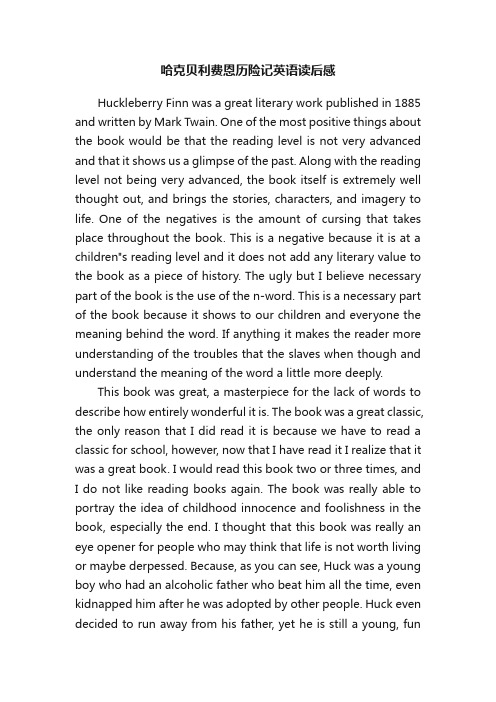
哈克贝利费恩历险记英语读后感Huckleberry Finn was a great literary work published in 1885 and written by Mark Twain. One of the most positive things about the book would be that the reading level is not very advanced and that it shows us a glimpse of the past. Along with the reading level not being very advanced, the book itself is extremely well thought out, and brings the stories, characters, and imagery to life. One of the negatives is the amount of cursing that takes place throughout the book. This is a negative because it is at a children"s reading level and it does not add any literary value to the book as a piece of history. The ugly but I believe necessary part of the book is the use of the n-word. This is a necessary part of the book because it shows to our children and everyone the meaning behind the word. If anything it makes the reader more understanding of the troubles that the slaves when though and understand the meaning of the word a little more deeply.This book was great, a masterpiece for the lack of words to describe how entirely wonderful it is. The book was a great classic, the only reason that I did read it is because we have to read a classic for school, however, now that I have read it I realize that it was a great book. I would read this book two or three times, and I do not like reading books again. The book was really able to portray the idea of childhood innocence and foolishness in the book, especially the end. I thought that this book was really an eye opener for people who may think that life is not worth living or maybe derpessed. Because, as you can see, Huck was a young boy who had an alcoholic father who beat him all the time, even kidnapped him after he was adopted by other people. Huck even decided to run away from his father, yet he is still a young, funloving kid in the end, especially when Tom reveals to him how the whole trip was just a game. The only thing I have to say against the book is that it did seem a little racist with its words, however maybe this is just how they talked in that time period? Overall a great read that I highly reccomend.。
贝多芬传英文观后感

贝多芬传英文观后感Beethoven: A Musical Genius Resonating Through TimeLudwig van Beethoven, a name that echoes through the halls of musical history. Born in Bonn, Germany, in 1770, Beethoven grew to become one of the most influential and celebrated composers of all time. His profound impact on music is undeniable, and his legacy continues to inspire generations of musicians and listeners alike. After watching the biographical film about his life, I couldn't help but reflect on the immense talent and unwavering spirit that defined Beethoven's remarkable journey.The film delves into Beethoven's life, exploring the struggles and triumphs that shaped him as a composer. From a young age, he displayed an extraordinary talent for music, catching the attention of renowned musicians and composers. But as fate would have it, tragedy struck early in his life when he began losing his hearing. This physical impairment seemed insurmountable, as it threatened to silence not only his music but also his entire existence.Yet, in the face of adversity, Beethoven refused to succumb to despair. He embarked on an arduous and often frustrating journey to adapt his compositions to his diminishing ability to hear. Through sheer determination and against all odds, he created some of his greatest masterpieces, including the iconic Ninth Symphony and the Moonlight Sonata. The film vividly captures the emotional intensity of these compositions, showcasing the depth of Beethoven's genius.What struck me most about Beethoven's story is his indomitable spirit and unwavering determination. Despite facing numerous setbacks and personal tragedies, he found solace and purpose in his music. He believed that music had the power to transcend all barriers and connect people from different walks of life. This belief was evident in the way his compositions resonated with audiences, evoking a range of emotions and inspiring profound introspection.Another aspect of Beethoven's life that the film explores is his complicated and often tumultuous personal relationships. From his close friendship with the nobleman Karl Amenda to his tumultuous love affairs, Beethoven's personal life was marked by both joy and heartbreak. These relationships undoubtedly influenced his music, infusing it with a depth of emotion and a sense of longing. The film skillfully depicts these complexities, shedding light on the man behind the music.Beethoven's impact on the world of music cannot be overstated. His innovations, such as his expansion of the symphony form and his unconventional use of musical themes, revolutionized classical music. He paved the way for future composers, giving them the freedom to experiment and break traditional norms. Even today, his music continues to be performed and cherished, enchanting listeners with its timeless beauty.As the credits rolled and the film came to a close, I couldn't help but feel a sense of awe and admiration for Beethoven. His unwavering dedication to his craft, his resilience in the face of adversity, and his ability to create such profound and emotive music are truly inspiring. His story serves as a reminder to us all that amidst the challenges and hardships of life, our passions and talents can be our guiding light.In conclusion, the film about Ludwig van Beethoven's life offers a captivating portrayal of a musical genius. It transports us back in time, allowing us to witness the transformative power of music and the indomitable spirit of a man who defied the odds. Beethoven reminds us that in embracing our passions and pursuing our dreams, we too can leave an indelible mark on the world. His legacy lives on, a testament to the enduring power of art and the triumph of the human spirit.。
谁动了我的奶酪读后感英文版

谁动了我的奶酪读后感英文版谁动了我的奶酪读后感英文版With a happy but complex feeling, I closed the book and drowned myself into deep thought. I have to recognize that it’s lucky for me to read this book, which is just like a mirror of our daily life.Two lovely mice Sniff, Scurry together with two little people Hem and Haw live in a big maze. They have to find cheese to feed themselves. Just as their names show, Sniff has a great sense of sniff and Scurry is able to run very fast. However, they are mice with simple thoughts. There’s no doubt that two little people are much cleverer than these mice, which are regarded as low-level creature by people. But the ending is surprising enough: the mice become the lucky dog and firstly adapt the changing situation. While the mice have already found new cheese and tasted the happiness of adventure, our two little people are still discussing the reasons and anglicizing their situation. They are afraid of changing and losing, because their wisdom tells them changing is a dangerous thing. This time, wisdom is no longer an advantage for them. Apparently, humans’ overly complicated and emotional intelligence sometimes do not advance way. The poorest character is Hem, no one knows his fate in the future, but we can imagine how hard it will be. Refusing changes bring him nothing but sadness. Haw is much luckier, though his action is not as quick as two mice, he take changes the moment he awake to his fault and learn a lot from the process. There’s no doubt that Haw’s han dwriting on the wall is the brightest point in the whole story. These truths encourage us to go out of the dilemma and adjust ourselves to the changing circumstances and enjoy the changesObviously, the maze represents our whole life and cheese represent the valuable things that we pursuit. We ourselves are playing the role of mice or little people in our realistic life. May be you’re mice who can take quick actions to change, then congratulations! But what if you are Hem? I believe no one of us want to be a second Hem without any cheese. So, just try to become Haw, simplify the problems and try new things without worrying. Surprise is ahead of you, success is just there, waiting for you.In my opinion, this story is a kind of scathing satire on people w ho don’t have an ability to adapt new surroundings quickly. In the future, change is the only constant. If you don’t want to be eliminated by the changing time, if you want to keep pace with the changing tide, please keep the alertness and give up conservative ideas. The future is full of changes, since you are already in the maze, how to find your" cheese" is the problem you have to deal with. There’s an old saying in China called security is the biggest enemy. No one can deny that a constant job or someth ing will kill people’s passion. But it will lead only two kinds of consequences: you make no progress or your condition becomes much worse. Someonerefuse to change because of the fear from the bottom of their heart. If you can’t overcome this psychology b arrier, you can’t knock open the door of success. All depends on you, choose to change and have a better life or to be stubborn and lose all the old cheese.Life is changing. Change is the only constant in the future. All you can do is to try your best to adapt the changing world bravely. God help those who help and change themselves!。
谁动了我的奶酪英文读后感

谁动了我的奶酪英文读后感(实用版)编制人:__________________审核人:__________________审批人:__________________编制单位:__________________编制时间:____年____月____日序言下载提示:该文档是本店铺精心编制而成的,希望大家下载后,能够帮助大家解决实际问题。
文档下载后可定制修改,请根据实际需要进行调整和使用,谢谢!并且,本店铺为大家提供各种类型的经典范文,如教学教案、阅读试题、诗歌鉴赏、教学随笔、日记散文、语录句子、报告总结、故事大全、作文大全、其他范文等等,想了解不同范文格式和写法,敬请关注!Download tips: This document is carefully compiled by this editor.I hope that after you download it, it can help you solve practical problems. The document can be customized and modified after downloading, please adjust and use it according to actual needs, thank you!In addition, this shop provides you with various types of classic sample essays, such as teaching lesson plans, reading questions, poetry appreciation, teaching essays, diary essays, quotations sentences, report summaries, stories, essays, other essays, etc. If you want to know the difference Please pay attention to the format and writing of the sample essay!谁动了我的奶酪英文读后感谁动了我的奶酪英文读后感细细品味一本名著后,相信大家的收获肯定不少,是时候静下心来好好写写读后感了。
《追风筝的人》英语读后感_《追风筝的人》英语读书笔记五篇
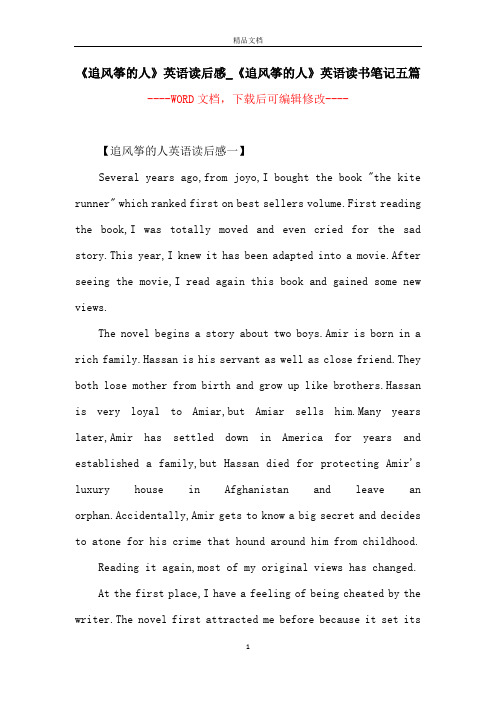
《追风筝的人》英语读后感_《追风筝的人》英语读书笔记五篇----WORD文档,下载后可编辑修改----【追风筝的人英语读后感一】Several years ago,from joyo,I bought the book "the kite runner" which ranked first on best sellers volume.First reading the book,I was totally moved and even cried for the sad story.This year,I knew it has been adapted into a movie.After seeing the movie,I read again this book and gained some new views.The novel begins a story about two boys.Amir is born in a rich family.Hassan is his servant as well as close friend.They both lose mother from birth and grow up like brothers.Hassan is very loyal to Amiar,but Amiar sells him.Many years later,Amir has settled down in America for years and established a family,but Hassan died for protecting Amir's luxury house in Afghanistan and leave an orphan.Accidentally,Amir gets to know a big secret and decides to atone for his crime that hound around him from childhood.Reading it again,most of my original views has changed.At the first place,I have a feeling of being cheated by the writer.The novel first attracted me before because it set itsplot in a special environment---Afghanistan which even I often got news about from TV and newspaper,I knew the country utterly ignorant except wars and terrorism.So I wanted to understand more about the calamitous country.However,I am disappointed by the novel which just use a special background environment to tell a so-called travel of human nature .The theme of the novel should be atonement if it was taken off flowery coat.Bad gay like Amir and and good gay like Hassan,adding some the present best sellers' polular elements like bastard,forming the main contents. In fact,the kite runner impressed me deeply and it just depends on sensational words.Besides,what makes me most dislike is that the writer,an Afghan-American,contorted some political elements for American advantages.The history background only make the affair of Russia invading and Taliban dictators go into particulars,but not mention America's ignominious role in this politics.Why Taliban dictators are so unruly?Why Russia invaded Afghanistan in 1979?Why Afghan people still live in poor condition nowadays?America,a main actor is disposed of in this novel.At the second place,the characters all serve to a tacky theme-atonement and birth secrects.When the birth secrects are exposed,the atonement travel begins.When the atonementfinishes,the story finishes.I even feel I am wrapped around the American media's little finger.Many celebrities and book concerns writed good comments,which helped it ranke first on sales volume for several times and made readers think it must get widely praised and then bought it without doubt finally.Though I think the disadvantages are more than advatages,compared with the back atonement part,I like the front part that describes the pure friendship and innocent childhood between two boys.The description about the culture of kite in Afghanistan is excellent.As a first book of the writer,it is resonable that the novel has some deficiencies.I hope his next and next works can more and more perfect.【追风筝的人英语读后感二】I have seen the novel's name --the Kite Runner many times from the InterNet,when it comes to "the novels moved you most".With curiosity,I downloaded it.When reading the novel,from the beginning to the end,I felt a heavy stone of sorrow on my heart.It is a story about friendship,about fault and atonement,about the good and evil of human natual.The narrator of the story,Amir ,is born in a rich family.Hassan is his servant as well as close friend.They both lose mother from birth and grow up like brothers.From Hassan ,I see the most kind and beautiful soul.He never means to hurt anyone.he protects Amir bravely and has a broad mind to endure what Amir do to him.With the promise to run the kite,he hands the last cut kite to Amir though he has insulted by the bully,Assef. for lifetime,he cherishes the friendship,even he dies of protecting Amir's house."For you,a thousand times over"he does as he says...If Hassan can be described as an angel, then Amir is just a person.when he is a boy,he is badly want father's love and care.he will be jealous,he will fear and be cowardly.When he sees Hassan insulted by Assef,he is so scared that he only hides and watches.he sees what happened but keeps it as a secret.In order to escape the guilt,he makes another fault, making Hassan leave by framing Hassan .Years past, he is still haunted by betraying his childhood friend.I was shocked when the big secret reveals: Hassan is Amir's half brother,the son of his father and a sevant's wife! Amir's father lives a torturing life,he is torn into two parts.He can't give Hassan the love in the name of a father,which is unfairto Hassan.That explains why he seems care little about Amir ...Knowing the truth,Amir has a painful struggle at the first,and finally chooses the right way,a way of atonement.He rescues Hassan's orphan ,Sorhab,from Assef's hand.At that time,he faces up to Assef's fists,being a man not cowardly.Having gone though a lot of difficulties,he finally brings Sorhab to American.But Sorhab is emotional damaged by adversity.Amir make efforts to revive the little heart.At the end of the story,Sorhab shows a lopside smile,which delights Amir much.Amir run kite for Hassan's son,and says what Hassan once said,"for you, a thousand times over".The snow will be melt,and the spring is coming...The ending is not clearly told,but full of hope.I like the author' written style.There's paragraghs of internal monologues,warm memorys , sad plots,horrible war scenes...the words,sentences always catch me tightly,make me think,make me cry...Now if someone ask me what novels impressed me most,The Kite Runner will be an answer.It is the first time I have seen a novel in English.It is hard for me to insist on reading as there are so many words I have to look up.But it really benefit me in some way.【追风筝的人英语读后感三】This is a wonderful, beautiful epic of a novel. Set in Afghanistan and the United States between the 1970s to the present day, it is a heartbreaking tale of a young boy, Amir, and his best friend who are torn apart. This is a classic word-of-mouth novel and is sure to become as universally loved as The God of Small Things and The Glass Palace.Twelve year old Amir is desperate to win the approval of his father Baba, one of the richest and most respected merchants in Kabul. He has failed to do so through academia or brawn, but the one area where they connect is the annual kite fighting tournament. Amir is determined not just to win the competition but to run the last kite and bring it home triumphantly, to prove to his father that he has the makings of a man. His loyal friend Hassan is the best kite runner that Amir has ever seen, and he promises to help him - for Hassan always helps Amir out of trouble. But Hassan is a Shi'a Muslim and this is 1970s Afghanistan. Hassan is taunted and jeered at by Amir's school friends; he is merely a servant living in a shack at the back of Amir's house. So why does Amir feel such envy towards his friend? Then, what happens to Hassan on the afternoon of the tournament is to shatter all their lives, and define their futures.The Kite Runner of Khaled Hosseini's deeply moving fiction debut is an illiterate Afghan boy with an uncanny instinct for predicting exactly where a downed kite will land. Growing up in the city of Kabul in the early 1970s, Hassan was narrator Amir's closest friend even though the loyal 11-year-old with "a face like a Chinese doll" was the son of Amir's father's servant and a member of Afghanistan's despised Hazara minority. But in 1975, on the day of Kabul's annual kite-fighting tournament, something unspeakable happened between the two boys.Narrated by Amir, a 40-year-old novelist living in California, The Kite Runner tells the gripping story of a boyhood friendship destroyed by jealousy, fear, and the kind of ruthless evil that transcends mere politics. Running parallel to this personal narrative of loss and redemption is the story of modern Afghanistan and of Amir's equally guilt-ridden relationship with the war-torn city of his birth. The first Afghan novel to be written in English, The Kite Runner begins in the final days of King Zahir Shah's 40-year reign and traces the country's fall from a secluded oasis to a tank-strewn battlefield controlled by the Russians and then the trigger-happy Taliban. When Amir returns to Kabul to rescueHassan's orphaned child, the personal and the political get tangled together in a plot that is as suspenseful as it is taut with feeling.The son of an Afghan diplomat whose family received political asylum in the United States in 1980, Hosseini combines the unflinching realism of a war correspondent with the satisfying emotional pull of master storytellers such as Rohinton Mistry. Like the kite that is its central image, the story line of this mesmerizing first novel occasionally dips and seems almost to dive to the ground. But Hosseini ultimately keeps everything airborne until his heartrending conclusion in an American piCnic park.【追风筝的人英语读后感四】It's a moving story and a mixture of love,fear,guilty,atonement and so on.For a lont time,it makes the books we read lost their color.The first time I read a book written by an Afghan atuhor named Khaled Hosseini ,it told a story between two boys.A rich boy Amir at the age of 12 and his servant Hasan were brotherly loved.Nevertheless,afer a kite game,something miserable happened.Amir feel grievous and guilty for his cowardice and he cannot confront Hansan,using something contempitable to letHansan and his father leave his home.Not long,Afghanistan broke ou a war,Amir and his father had to fled to America.After his grown- up,he cannot forgave what he had done to Hansan before.And to atone for himself,he returned his hometown,which was destoryed badly by the war......Maybe all of us more or less had done something as Amir did before,we are too young to understand others feelings when we broke their heart into pieces.We may feel guilty and miserable for waht we have done.But there is no use to cry over spilt milk.What we really should do is to face the reality and like Amir,to atone for ourselves.【追风筝的人英语读后感五】I hate wars which make the world bloody ,cold and cruel, so I do not want to talk about the war. But it is miraculous to see a kite is cut off by another one. And the kite which is cut off flies away like a free bird. Hassan said to Amir that for you, one thousand times over. At first, I tought the friendship between Hassan and Amir was so deep. But then I found tha t Hassan was a servant in Amir’s home and began to realize it is some kind of loyalty.Though Hassan always said that Amir treated him as a friend, deep in his mind, he did not put them on the same line. In hiseyes, Amir is the person he should look up to and protect, even do whatever he can do to help. Amir was affluence in material, but he did not have friends because of his race. I dislike him because he always ran away when Hassan was hurted by the others in order to protect him. In my opinion, if he stand up fo Hassan, things would have been different. I could not understand why Amir cheated to make Hassan leave at first, though their “friendship” is complicated. Now I come to know that Amir may try to push Hassan out of the position as a servant. And he wished that they stand in the same line and Hassan can chase for the things wanted by himself. Though Amir’s father said that a boy who won’t stand up for himself, becomes a man who won’t stand for anything, Amir finally turned into a brave man who standed up for Sohrab, the son of Hassan.The kite tied Hassan and Amir tighter tighly. When I saw Hassan running after the kite, I realized that he was chasing for freedom as well. However when I saw Hassan running after the kite, I thought he was learning to protect things he cherished. There are many kites we are willing to have, but do you have the courage to chase for them?《追风筝的人》。
贫民窟的百万富翁英文读后感
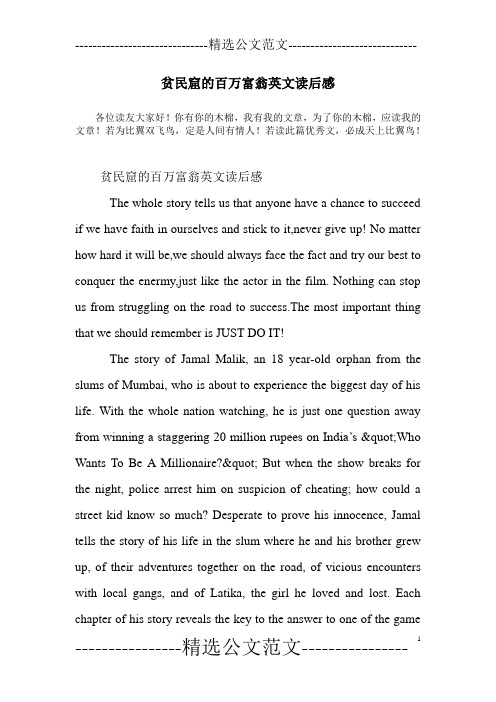
贫民窟的百万富翁英文读后感各位读友大家好!你有你的木棉,我有我的文章,为了你的木棉,应读我的文章!若为比翼双飞鸟,定是人间有情人!若读此篇优秀文,必成天上比翼鸟!贫民窟的百万富翁英文读后感The whole story tells us that anyone have a chance to succeed if we have faith in ourselves and stick to it,never give up! No matter how hard it will be,we should always face the fact and try our best to conquer the enermy,just like the actor in the film. Nothing can stop us from struggling on the road to success.The most important thing that we should remember is JUST DO IT!The story of Jamal Malik, an 18 year-old orphan from the slums of Mumbai, who is about to experience the biggest day of his life. With the whole nation watching, he is just one question away from winning a staggering 20 million rupees on India’s "Who Wants To Be A Millionaire?" But when the show breaks for the night, police arrest him on suspicion of cheating; how could a street kid know so much? Desperate to prove his innocence, Jamal tells the story of his life in the slum where he and his brother grew up, of their adventures together on the road, of vicious encounters with local gangs, and of Latika, the girl he loved and lost. Each chapter of his story reveals the key to the answer to one of the gameshow’s questions. Each chapter of Jamal’s increasingly layere d story reveals where he learned the answers to the show’s seemingly impossible quizzes. But one question remains a mystery: what is this young man with no apparent desire for riches really doing on the game show? When the new day dawns and Jamal returns to answer the final question, the Inspector and sixty million viewers are about to find out. At the heart of its storytelling lies the question of how anyone comes to know the things they know about life and love. Written by Fox Searchlight PicturesEighteen year old Jamal Malik is having an amazing answering streak on the Indian version of the television game show, "Who Wants to Be a Millionaire". He’s only one correct question away from the big prize. However, some, including those associated with the game show, question how someone like Jamal, a self confessed non-genius who grew up in the slums of Mumbai, can be doing so well on the show when others who are brighter, more educated and wealthier than him have failed. Is Jamal cheating? Is it purely luck that they have asked him the questions to which he knows the answers? Seeing Jamal’s life journey to this point ultimately answers these questions. His life journey includes being orphaned at an early age; growing up with an older brother, Salim, who was both his guardian/protector and antagonist; and having arelationship since childhood with another orphaned child, a girl named Latika. His motivation for being on the show also may provide some answers to his success. Perhaps it was all just meant to be. Written by HuggoIn Mumbai, the eighteen year-old orphan from the slums Jamal Malik is tortured by the policemen in a precinct accused of cheating a game show. Jamal, who has no education and works in a call center serving tea, is close to wining twenty million rupees in the show "Who Wants to Be a Millionaire?" hosted by Prem Kumar, giving precise answers to the questions and raising suspicion of fraud. The police inspector shows the videotape and after each question, Jamal tells parts of his childhood with his brother Salim, his crush for Latika and their fight to survive on the streets to justify each correct answer, guided by his common sense and past experience, and prove his innocence.各位读友大家好!你有你的木棉,我有我的文章,为了你的木棉,应读我的文章!若为比翼双飞鸟,定是人间有情人!若读此篇优秀文,必成天上比翼鸟!。
追风筝的人英语读后感范文(通用3篇)
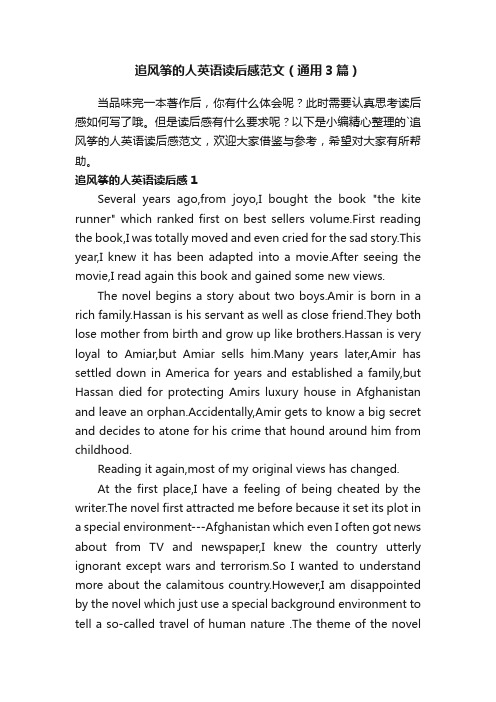
追风筝的人英语读后感范文(通用3篇)当品味完一本著作后,你有什么体会呢?此时需要认真思考读后感如何写了哦。
但是读后感有什么要求呢?以下是小编精心整理的`追风筝的人英语读后感范文,欢迎大家借鉴与参考,希望对大家有所帮助。
追风筝的人英语读后感1Several years ago,from joyo,I bought the book "the kite runner" which ranked first on best sellers volume.First reading the book,I was totally moved and even cried for the sad story.This year,I knew it has been adapted into a movie.After seeing the movie,I read again this book and gained some new views.The novel begins a story about two boys.Amir is born in a rich family.Hassan is his servant as well as close friend.They both lose mother from birth and grow up like brothers.Hassan is very loyal to Amiar,but Amiar sells him.Many years later,Amir has settled down in America for years and established a family,but Hassan died for protecting Amirs luxury house in Afghanistan and leave an orphan.Accidentally,Amir gets to know a big secret and decides to atone for his crime that hound around him from childhood.Reading it again,most of my original views has changed.At the first place,I have a feeling of being cheated by the writer.The novel first attracted me before because it set its plot in a special environment---Afghanistan which even I often got news about from TV and newspaper,I knew the country utterly ignorant except wars and terrorism.So I wanted to understand more about the calamitous country.However,I am disappointed by the novel which just use a special background environment to tell a so-called travel of human nature .The theme of the novelshould be atonement if it was taken off flowery coat.Bad gay like Amir and and good gay like Hassan,adding some the present best sellers polular elements like bastard,forming the main contents. In fact,the kite runner impressed me deeply and it just depends on sensational words.Besides,what makes me most dislike is that the writer,an Afghan-American,contorted some political elements for American advantages.The history background only make the affair of Russia invading and Taliban dictators go into particulars,but not mention Americas ignominious role in this politics.Why Taliban dictators are so unruly?Why Russia invaded Afghanistan in 1979?Why Afghan people still live in poor condition nowadays?America,a main actor is disposed of in this novel.At the second place,the characters all serve to a tacky theme-atonement and birth secrects.When the birth secrects are exposed,the atonement travel begins.When the atonement finishes,the story finishes.I even feel I am wrapped around the American medias little finger.Many celebrities and book concerns writed good comments,which helped it ranke first on sales volume for several times and made readers think it must get widely praised and then bought it without doubt finally.Though I think the disadvantages are more than advatages,compared with the back atonement part,I like the front part that describes the pure friendship and innocent childhood between two boys.The description about the culture of kite in Afghanistan is excellent.As a first book of the writer,it is resonable that the novel has some deficiencies.I hope his next and next works can more and more perfect.追风筝的人英语读后感2I have seen the novels name --the Kite Runner many times from the Internet,when it comes to "the novels moved you most".With curiosity,I downloaded it.When reading the novel,from the beginning to the end,I felt a heavy stone of sorrow on my heart.It is a story about friendship,about fault and atonement,about the good and evil of human natual.The narrator of the story,Amir ,is born in a rich family.Hassan is his servant as well as close friend.They both lose mother from birth and grow up like brothers.From Hassan ,I see the most kind and beautiful soul.He never means to hurt anyone.he protects Amir bravely and has a broad mind to endure what Amir do to him.With the promise to run the kite,he hands the last cut kite to Amir though he has insulted by the bully,Assef. for lifetime,he cherishes the friendship,even he dies of protecting Amirs house."For you,a thousand times over"he does as he says…If Hassan can be described as an angel, then Amir is just a person.when he is a boy,he is badly want fathers love and care.he will be jealous,he will fear and be cowardly.When he sees Hassan insulted by Assef,he is so scared that he only hides and watches.he sees what happened but keeps it as a secret.In order to escape the guilt,he makes another fault, making Hassan leave by framing Hassan .Years past, he is still haunted by betraying his childhood friend.I was shocked when the big secret reveals: Hassan is Amirs half brother,the son of his father and a sevants wife! Amirs father lives a torturing life,he is torn into two parts.He cant give Hassan the love in the name of a father,which is unfair to Hassan.Thatexplains w hy he seems care little about Amir …Knowing the truth,Amir has a painful struggle at the first,and finally chooses the right way,a way of atonement.He rescues Hassans orphan ,Sorhab,from Assefs hand.At that time,he faces up to Assefs fists,being a man not cowardly.Having gone though a lot of difficulties,he finally brings Sorhab to American.But Sorhab is emotional damaged by adversity.Amir make efforts to revive the little heart.At the end of the story,Sorhab shows a lopside smile,which delights Amir much.Amir run kite for Hassans son,and says what Hassan once said,"for you, a thousand times over".The snow will be melt,and the spring is coming…The ending is not clearly told,but full of hope.I like the author written style.Theres paragraghs of internal mono logues,warm memorys , sad plots,horrible war scenes…the words,sentences always catch me tightly,make me think,make me cry…Now if someone ask me what novels impressed me most,The Kite Runner will be an answer.It is the first time I have seen a novel in English.It is hard for me to insist on reading as there are so many words I have to look up.But it really benefit me in some way.追风筝的人英语读后感3I hate wars which make the world bloody ,cold and cruel, so I do not want to talk about the war. But it is miraculous to see a kite is cut off by another one. And the kite which is cut off flies away like a free bird. Hassan said to Amir that for you, one thousand times over. At first, I tought the friendship between Hassan and Amir was so deep. But then I found that Hassan was a servant in Amir’s home and began to realize it is some kind of loyalty.Though Hassan always said that Amir treated him as a friend,deep in his mind, he did not put them on the same line. In his eyes, Amir is the person he should look up to and protect, even do whatever he can do to help. Amir was affluence in material, but he did not have friends because of his race. I dislike him because he always ran away when Hassan was hurted by the others in order to protect him. In my opinion, if he stand up fo Hassan, things would have been different. I could not understand why Amir cheated to make Hassan leave at first, though their “friendship” is complicated. Now I come to know that Amir may try to push Hassan out of the position as a servant. And he wished that they stand in the same line and Hassan can chase for the things wanted by himself. Though Amir’s father said that a boy who won’t stand up for himself, becomes a man who won’t stand for anything, Amir finally turned into a brave man who standed up for Sohrab, the son of Hassan.The kite tied Hassan and Amir tighter tighly. When I saw Hassan running after the kite, I realized that he was chasing for freedom as well. However when I saw Hassan running after the kite, I thought he was learning to protect things he cherished. There are many kites we are willing to have, but do you have the courage to chase for them?。
- 1、下载文档前请自行甄别文档内容的完整性,平台不提供额外的编辑、内容补充、找答案等附加服务。
- 2、"仅部分预览"的文档,不可在线预览部分如存在完整性等问题,可反馈申请退款(可完整预览的文档不适用该条件!)。
- 3、如文档侵犯您的权益,请联系客服反馈,我们会尽快为您处理(人工客服工作时间:9:00-18:30)。
Copying Beethoven(《复制贝多芬》影评)In the movies, the life of the mind often turns to mush and stories about genius tend to be painfully dumb. Film seems to have such a firm hold on exterior reality that the inner world of creation is simply too mysterious and elusive for commercial stories that depend on objects and actions, too obscure for a medium that depends on light. And so most filmmakers give us painters slashing away at canvases with grim determination and writers nibbling on pens that might as well be magic wands, pantomimes of inspiration spiked with the usual flavorings of perversion, despair, alienation and tragedy.At first glance the period film “Copying Beethoven” looks as if it might be following a familiar course. To begin with, there is Ed Harris ina Beethoven wig. It’s a fine wig, but wigs are generally worrisome, particularly when atop a head that seems quintessentially modern American. Then there is the matter of the young German actress Diane Kruger, who had the misfortune to play Helen in Wolfgang Petersen’s “Troy” and looks too beautiful to play a role of any substance. That, at least, is one lesson imparted by Hollywood, where, as around the 12th century B.C., attractive women are often little more than prizes to be passed around onscreen. Happily, the film directorAgnieszka Holland, whose previous features include“Europa, Europa,” is herself a woman of substance.“Copying Beethoven” takes place in 1824, toward the end of Beethoven’s life. Ms. Kruger plays Anna Holtz, a Viennese music student who through talent, ambition and happenstance finds herself summoned to transcribe Beethoven’s messy musical notations. Stone deaf, Beethoven initially rebuffs her services (you’re a woman, he all but shouts, as if her sex were a crime), but quickly relents. Time and life are running out, and he is too preoccupied with finishing his latest symphony to rout out someone new. So together, in a darkly lighted apartment where rats scuttle underfoot amid eggshells and overflowing chamber pots, he composes and she copies. In time, the work and the notes join forces until one evening, with Beethoven conducting, the Ninth Symphony erupts into a dazzled world.The presentation of the Ninth is reason alone to see the film. Onscreen is the Kecskemet Symphony Orchestra of Hungary, but what we hear is a 1996Decca recording of Bernard Haitink conducting the Royal Concertgebouw Orchestra of Amsterdam. Purists may object to this strategy, but Ms. Holland’s filmmaking in this scene is so sensitive that only quibblers will notice if the bowing doesn’t match the sound. With her cinematographer, Ashley Rowe, and editor, Alex Mackie, she orchestrates bursts of images and metronomic camera pans that become a visual counterpoint to the music’s propulsive and flowing tempos, its rushing violins and soaring voices. Every so often the camera focuses on one of Beethoven’s hands, the fingertips stirring the air as if rustling the notes. The world falls away, blissfully.The screenwriter Stephen J. Rivele, who wrote “Copying Beethoven” with Christopher Wilkinson (their other credits include “Nixon” and “Ali”), has explained that the idea for the film originated with Anthony Hopkins, who subsequently opted not to take the role. Mr. Harris, an actor who can show the storms gathering under a character’s skin, proves an ideal substitute. Topped with that messy salt-and-pepper wig that frames and obscures his scowling, searching face, he invests Beethoven with a violent turbulence that sometimes floods the room but mostly stays coiled inside, where it seethes. (Even his darkened eyebrows look furious.) This isn’t the narcissistic rage of movie-made genius, but the private agonies of a man who lives very much alone in his head.“Copying Beethoven” doesn’t shed light on those torments, partly because the screenwriters keep a respectful distance from their subject and partly because Ms. Holland is too smart and unsentimental to fall into such a storybook trap. Beethoven’s nephew Karl (Joe Anderson) expresses revulsion at his uncle’s affection for him. But, happily, no one delivers a speech about the psychological undergirding of a relationship that would, finally, be known only to these long-dead men. When Beethoven talks about Karl, Mr. Harris releases his scowl as if unclenching a fist; you don’t need to hear the composer describe his love and pain, you see them. Ms. Kruger, alas, must explain more, largely because of her gender, which needs both contextual explanation and, apparently, a love interest.According to Mr. Rivele, the character of Anna Holtz, though based on two of Beethoven’s male copyists, was created in part because the intimation of a love story helped finance the production. That seems plausible. Certainly a film about an irritable male genius and his male assistantsmight not be as entrancing as the image of Ms. Kruger scrubbing a floor on her hands and knees, skirt pushed up to reveal a sliver of luminous skin. This isn’t a criticism: Ms. Kruger looks exceedingly fetching whether on the floor or hunched over a desk. More to the point, her attractiveness is not irrelevant in a film with such an unembarrassed feeling for beauty, be it in a woman’s face or a rapturous ode to joy.。
